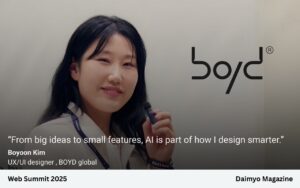Website chatbots have long promised convenience, but for many users, they’ve been more frustrating than helpful
slow, clunky, and often quick to hand things off to a live agent. Bill Rogers, CEO of ai12z, believes that era is
over. And he’s betting on a new kind of AI assistant that’s not just conversational, but conversional.
“What we do is create a technology for your website a digital assistant that actually helps people
navigate and act,
” Rogers explained at Web Summit.
“We ingest your content, answer real questions,
and guide users with calls to action that drive your brand forward.

Unlike traditional site search or static chatbots, ai12z’s AI assistant is trained to go beyond basic answers. It
integrates deeply with back-end systems like CRMs, email platforms, and product databases, offering a more
intelligent, responsive experience. It doesn’t just tell you where to find something it takes you there, with context,
logic, and purpose.
While e-commerce sites are a natural fit especially given the platform’s ability to reduce bounce rates and
increase conversion in fewer clicks the product is far from industry-specific.
“It can be used on any website in the world,
” Rogers said.
“We’re seeing adoption across nonprofits,
education sites, and service-based businesses. The results are immediate because people are finally
getting what they came for without having to pick up the phone or click through ten pages.
”
One of the most compelling use cases has been in customer support. ai12z allows websites to ingest large
repositories of information even something like a 200-page PDF call center guide and answer questions with a
level of specificity that mirrors a trained human agent. For organizations trying to lower support center costs while
improving service, this is a breakthrough.
“We’ve seen people abandon websites because they couldn’t find answers,
” Rogers noted.
get them faster, and with fewer clicks, they’re more likely to stay, convert, or solve their own
problems.
”

“Now they
The technology behind ai12z is just as flexible as the experience it offers. The platform supports 15 different
large language models, including OpenAI, Gemini, and LLaMA letting businesses choose the model that best
fits their needs, risk tolerance, or infrastructure preferences.
“We give customers a maturity model crawl, walk, run so they can launch fast,
” Rogers explained.
“Some clients had their entire website ingested and a working assistant live within an hour at the
show. For those who want deeper integrations, we build from there.
”
What really sets ai12z apart, though, is its focus on marketers, not engineers. The interface is built for
non-technical users who need to get results quickly. While engineers can extend the platform with custom
workflows and integrations, out of the box, the product is designed to empower business users particularly those
responsible for customer experience and growth.
“Our focus is the experience of the owner of the system,
” said Rogers.
get this up and running and see value fast.
”
“Marketers should be able to
At a time when AI hype is everywhere, ai12z delivers something refreshingly tangible: fewer clicks, faster
answers, and smarter user journeys. And for website owners, that translates into something even more valuable
better results.
To learn more about ai12z and how its AI assistant can transform your website experience, visit ai12z.com.